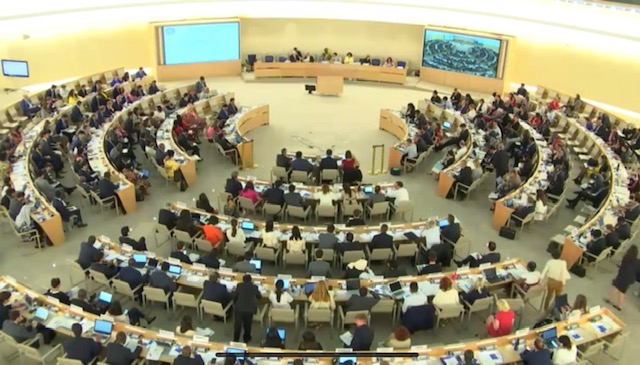By Manuel Mogato

The 41st Session of the UN Human Rights Council in Geneva last week.
Foreign Secretary Teodoro “Teddy Boy” Locsin Jr. had an interesting tweet on Saturday, saying the Philippines should follow the move of the United States to voluntarily leave the United Nations Human Rights Council (UNHRC) for its failure to reform itself and allow countries that are persistent rights violators, like China, Saudi Arabia and Egypt, to be part of the 47-member body.
Washington turned its back on UNHRC in June 2018, criticizing the rights body’s bias against Israel, the first country to voluntarily leave the council and the second member of the council that did not complete its full UNHRC term. Libya was the first to leave when the United Nations removed it from the council in 2011.
The Philippines, however, must weigh carefully its decision to quit the UNHRC. It could stay, but behave like other countries with dismal human rights records in protecting their own state interest by blocking every resolution in the council condemning the human rights situation in their respective territories.
For example, tiny Burundi, a landlocked country in the central and eastern African contingent, whose term in the UNHRC ended last year, had voted to reject every resolution, including its on own human rights situation, during the time it was part of the UNHRC.
Early this year, it closed down the United Nations Human Rights office in its largest city. It had expressed its intention to withdraw from the International Criminal Court in 2016, a move that the Philippines followed last year.
Perhaps, Burundi is the true model of Secretary Locsin, not the United States. Burundi has also shut down most international non-government organizations (NGOs) operating in the country despite facing a serious humanitarian crisis marked by widespread human rights abuses, disease outbreak, extreme food insecurity and economic decline.
China, which the Philippines considers a friend, has been using its position in the UNHRC to block critical scrutiny of its own rights brutal and violent crackdown, and vote against resolutions condemning grave international crimes, including in Syria, Yemen, and Myanmar. Perhaps, it is another perfect role model for the Philippines, not the United States as the country’s top diplomat wants the Filipino people to believe.
No country has a perfect rights record. And many countries seeking a seat on the council are sadly those with bad human rights records, like Eritrea, Cameroon and Bahrain. These three countries, like the Philippines, are joining the UNHRC for a three-year term this year.
The UNHRC is fast losing its credibility because it is slowly becoming an exclusive club of countries with terrible human rights records, instead of true beacons of democracy, transparency, tolerance and with respect for human dignity and rights.
The United States must be right when it decided to leave the UNHRC. It was not protesting scrutiny of its own human rights record. It was protesting the membership of human rights violators in the council and the structural flaws in the system that allowed countries, like China, to sit on the council.
Perhaps, the Philippines does not deserve its seat and leaving the council is the right thing to do, because it refuses to acknowledge blatant rights abuses – the thousands of poor Filipinos getting killed in the brutal and bloody drug war since mid-2016.
The Philippine National Police simply cannot justify the more than 6,600 deaths in its anti-drug operations in almost identical circumstances – sting operations (buy-bust) gone wrong and ending up in all-too-familiar shootouts with street-level drug peddlers. This was the same template seen during the iron-fisted rule of the late dictator Ferdinand Marcos.
In the 1970s and 1980s, these incidents were called “salvaging”; they have been given a fresh term – “nanlaban” (those who fought back).
It is about time the UNHRC instituted reforms to regain its image and become a champion of human rights, upholding the principles and standards by which it was created by the United Nations General Assembly.
The United Nations Human Rights Council must not be a place for countries that violate human rights to seek shelter in. It should be the uncomfortable place for rights abusers, a place where they know they will be held to a higher standard and put under the spotlight for their violations and transgressions. Yes, Mr. Locsin, the Philippines does not deserve to be there. Leave and let the Philippines allow an impartial investigation into the deadly drug killings.